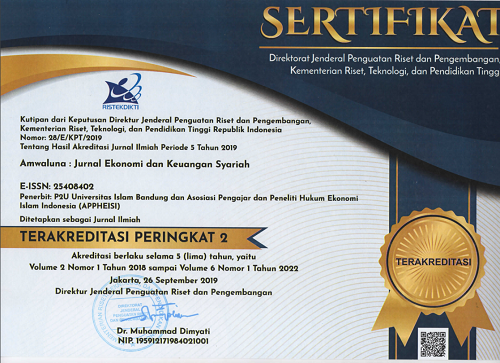ANALYSIS OF MUSLIM FRIENDLY TOURISM INDICATORS TOWARD THE NUMBER OF FOREIGN TOURIST VISITATIONS
Abstract
Muslim Friendly Tourism (MFT) ordinarily caters to meet Muslim tourists' needs and lifestyles. Many Muslim-friendly tourist destinations are currently being offered by countries incorporated in the Organization of Islamic Cooperation (OIC). Nonetheless, statistical evidence shows that the number of non-Muslims foreign tourists is far ahead of Muslim travelers. This study aims to analyze the impression of MFT indicators on the number of foreign tourist visits and define specific indicators that have a principal power influencing international visitations to the countries incorporated in the OIC. Panel data regression method with time-series data is processed using Econometric Views (Eviews 9.0) as an analysis tool. The results showed that eight independent variables on the Global Muslim Travel Index (GMTI) collectively affected the dependent variable by 97.49%. The present study found that the family-friendly destination variable has a simultaneous effect of 0.012, yet seven other variables did not significantly influence the number of foreign tourists traveling to countries incorporated in the OIC.
Keywords
Full Text:
PDFReferences
Adwiyah, R. (2015). Kesiapan Sumber Daya Manusia Bidang Pariwisata Indonesia dalam Menghadapi MEA 2015. Jurnal Performa, 12(1), 1–16.
Ainin, S., Feizollah, A., Anuar, N. B., & Abdullah, N. A. (2020). Sentiment analyses of multilingual tweets on halal tourism. Tourism Management Perspectives, 34. https://doi.org/10.1016/j.tmp.2020.100658
Ali, A., Xiaoling, G., Sherwani, M., & Ali, A. (2017). Factors affecting Halal meat purchase intention: evidence from international Muslim students in China. British Food Journal, 119(3), 527–541.
Asthu, A. A. (2020). Efek Destinasi Pariwisata terhadap Jumlah Kunjungan Wisatawan Mancanegara ke Asia Pasifik. Intermestic: Journal of International Studies, 5(1), 133. https://doi.org/10.24198/intermestic.v5n1.8
Battour, M., Battor, M., & Bhatti, M. A. (2013). Islamic Attributes of destination: construct development and measurement validation, and their impact on tourist satisfaction. International Journal of Tourism Research, 16(6), 556–564. https://doi.org/10.1002/jtr
Battour, M., & Ismail, M. N. (2016). Halal tourism: Concepts, practises, challenges and future. In Tourism Management Perspectives (Vol. 19, pp. 150–154). Elsevier. https://doi.org/10.1016/j.tmp.2015.12.008
Boğan, E., Dedeoğlu, B. B., Batman, O., & Yıldırgan, R. (2020). Exploring the predictors of prospective employees’ job pursuit intention in Muslim-friendly hotels. Tourism Management Perspectives, 34. https://doi.org/10.1016/j.tmp.2020.100663
Ghozali, I. (2011). Aplikasi analisis multivariate dengan program IBM SPSS 19. Badan Penerbit Universitas Diponegoro.
Gómez-Vega, M., & J Picazo-Tadeo, A. (2019). Ranking world tourist destinations with a composite indicator of competitiveness: to weigh or not to weigh? Tourism Management, 72(June 2019), 281–291. https://doi.org/10.1016/j.tourman.2018.11.006
Han, H., Al-Ansi, A., Olya, H. G. T., & Kim, W. (2019). Exploring Halal-friendly destination attributes in South Korea: perceptions and behaviors of Muslim travelers toward a non-Muslim destination. Tourism Management, 71(April 2019), 151–164. https://doi.org/10.1016/j.tourman.2018.10.010
Han, H., & Hyun, S. S. (2017). Impact of hotel-restaurant image and quality of physical-environment , service , and food on satisfaction and intention. International Journal of Hospitality Management, 63(May 2017), 82–92. https://doi.org/10.1016/j.ijhm.2017.03.006
Jafari, J., & Scott, N. (2014). Muslim world and its tourisms. Annals of Tourism Research, 44(January 2014), 1–19. https://doi.org/10.1016/j.annals.2013.08.011
Jarvis, D., Stoeckl, N., & Liu, H. B. (2016). The impact of economic, social and environmental factors on trip satisfaction and the likelihood of visitors returning. Tourism Management, 52(February 2016), 1–18. https://doi.org/10.1016/j.tourman.2015.06.003
Kubickova, M., & Martin, D. (2020). Exploring the relationship between government and destination competitiveness : the TALC model perspective. Tourism Management, 78(June 2020), 104040. https://doi.org/10.1016/j.tourman.2019.104040
Marrocu, E., Paci, R., & Zara, A. (2015). Micro-economic determinants of tourist expenditure: a quantile regression approach. Tourism Management, 50(October 2015), 13–30. https://doi.org/10.1016/j.tourman.2015.01.006
MasterCard-CrescentRating. (2015). Global Muslim Travel Index 2015.
MasterCard-CrescentRating. (2016). Global Muslim Travel Index 2016.
MasterCard-CrescentRating. (2017). Global Muslim Travel Index 2017.
MasterCard-CrescentRating. (2018). Global Muslim Travel Index 2018.
MasterCard-CrescentRating. (2019). Global Muslim Travel Index 2019.
Mendola, D., & Volo, S. (2017). Building Composite Indicators In Tourism Studies : Measurements And Applications in tourism destination competitiveness. Tourism Management, 59(April 2017), 541–553. https://doi.org/10.1016/j.tourman.2016.08.011
Mohsin, A., Ramli, N., & Abdulaziz, B. (2016). Halal tourism : emerging opportunities. Tourism MAnagemen, 19(July 2016), 137–143. https://doi.org/10.1016/j.tmp.2015.12.010
Oktadiana, H., Pearce, P. L., & Chon, K. (2016). Muslim travellers’ needs: What don’t we know? Tourism Management Perspectives, 20(October 2016), 124–130. https://doi.org/10.1016/j.tmp.2016.08.004
Paci, R., & Marrocu, E. (2014). Tourism And Regional Growth In Europe. Papers in Regional Science, 93(S1), S25–S50. https://doi.org/10.1111/pirs.12085
Pew-Templeton. (2015). Religion Information Data Explorer.
Ryan, C. (2016). Halal tourism. In Tourism Management Perspectives (Vol. 19, pp. 121–123). Elsevier. https://doi.org/10.1016/j.tmp.2015.12.014
Santamaria, D., & Filis, G. (2019). Tourism demand and economic growth in Spain: new insights based on the yield curve. Tourism Management, 75(December 2019), 447–459. https://doi.org/10.1016/j.tourman.2019.06.008
Shafaei, F., & Mohamed, B. (2015). Involvement and brand equity: a conceptual model for Muslim tourists. International Journal of Culture, Tourism and Hospitality Research, 9(1), 54–67.
Srihadi, T. F., Hartoyo, Sukandar, D., & Soehadi, A. W. (2016). Segmentation of the tourism market for Jakarta: classification of foreign visitors’ lifestyle typologies. Tourism Management Perspectives, 19(July 2016), 32–39. https://doi.org/10.1016/j.tmp.2016.03.005
Srisusilawati, P. (2020). Factors Affecting Tourist Interest on Sharia Tourism. Al-Uqud : Journal of Islamic Economics, 4(2), 200. https://doi.org/10.26740/al-uqud.v4n2.p200-207
Stephenson, M. L. (2014). Deciphering ‘ Islamic hospitality ’ : developments , challenges and opportunities. Tourism Management, 40(February 2014), 155–164. https://doi.org/10.1016/j.tourman.2013.05.002
Tang, C. F., & Tan, E. C. (2013). How stable is the tourism-led growth hypothesis in Malaysia? Evidence from disaggregated tourism markets. Tourism Management, 37(August 2013), 52–57. https://doi.org/10.1016/j.tourman.2012.12.014
United Nation World Travel Organization. (2019). International Tourism Highlights 2019 Edition. https://doi.org/https://www.e-unwto.org/doi/pdf/10.18111/9789284421152?download=true
Webster, C., & Ivanov, S. (2014). Transforming competitiveness into economic benefits: does tourism stimulate economic growth in more competitive destinations? Tourism Management, 40(February 2014), 137–140. https://doi.org/10.1016/j.tourman.2013.06.003
World Bank. (2020a). International Tourism, Expenditures (Current US$) | Data.
World Bank. (2020b). International Tourism, Number Of Arrivals | Data.
Yousaf, S., & Xiucheng, F. (2018). Halal culinary and tourism marketing strategies on government websites: A preliminary analysis. Tourism Management, 68(October 2018), 423–443. https://doi.org/10.1016/j.tourman.2018.04.006
DOI: https://doi.org/10.29313/amwaluna.v5i1.5988
Refbacks
- There are currently no refbacks.
Editorial Office:
Syariah Faculty, Universitas Islam Bandung
Jalan Tamansari No. 24-26 Kota Bandung

Amwaluna : Jurnal Ekonomi dan Keuangan Syariah is licensed under a Creative Commons Attribution-NonCommercial-ShareAlike 4.0 International License.








